If you are pursuing a career in finance, your resume is a critical tool for showcasing your skills, qualifications, and experience to potential employers. A well-crafted resume can help you stand out from other candidates and increase your chances of landing your dream job in the finance industry. However, crafting an effective one can be a daunting task, especially if you are unsure about what employers are looking for in a candidate.
In this article, we will provide tips and guidance on how to create a standout finance resume that highlights your strengths and positions you as a top candidate in the eyes of potential employers.
What Should Be Included in a Resume for a Financial Expert?
Your resume is a tool you use to market yourself. It should present you in the best light by showcasing your best skills and qualifications to the recruiter. It should also show the recruiter how you will benefit the potential employer if hired. It is necessary to have the required content, such as the header, your job summary, and other items. In addition, the content should be structured in a way to highlight your achievements.
You should include the following items in it:
State your name and provide contact information, such as your email address and phone number, in the header. While it is unnecessary, it helps if you add your LinkedIn profile to your header. As a social media platform, LinkedIn lets you display your connections and makes you appear knowledgeable about current trends.
Resume summary or objective
The summary is a brief description of your skills and experiences. It is meant to attract the attention of the recruiter. You need to include the highlights of your career and the skills and experience relevant to the position you seek. The summary should let the recruiter know what to expect from your resume.
It is not mandatory to include a summary or objective statement. However, it is recommended because it allows the recruiter to have a synopsis of the CV. The objective includes a brief introduction of the applicant. The applicant should introduce themselves as a professional in the finance industry and explain their relevant work experience and skills. Highlight your career accomplishments and skills and relate them to the job description to show that you are suitable for the job.
Both summary and objective statements are important. However, there are specific situations when you should use them. A summary statement is preferred for more experienced applicants, especially those with 2 years or more of work experience. Objective statements are preferred for applicants applying for entry-level jobs or those switching careers.
Work experience
The work experience section of a finance resume is a critical component that showcases your professional achievements, skills, and expertise in the field. To craft an effective work experience section, it is important to highlight your most relevant and impressive experiences clearly and concisely. Begin by listing your most recent job first and then working your way back chronologically. For each job, include your job title, the name of the company, and the dates of your employment.
Then, provide a summary of your responsibilities and achievements in each role, focusing on concrete examples of how you contributed to the success of the organization. It is important to use action verbs and quantify your achievements whenever possible, such as “increased revenue by 20%” or “led a team of 5 analysts to complete a successful financial project”. By emphasizing your accomplishments and demonstrating your impact on previous employers, you can position yourself as a strong candidate for finance positions and increase your chances of landing your desired job.
Educational background
The educational background provides an overview of your formal education. If applying for an entry-level job, mention the degree and the relevant coursework. You may also mention your GPA. Where you have more than two years of work experience, briefly state the university you attended, the degree you hold, and the study period.
Include any relevant certifications and licenses you have that are relevant to the qualifications required for the job posting. These certifications and licenses increase your chances of getting the job because they demonstrate your expertise.
When listing your formal qualifications, it is recommended to be as specific as possible and to begin with your highest accomplishment. It allows the recruiter to see your education’s flow and growth.
As such, you should include the following information:
- The college/university attended
- The city/state
- The years attended
- Degree earned
- Major
Some jobs may specify that the educational requirements for advertised positions require particular certifications, while others may not. Regardless, you should mention any specialized training, like data analysis certification.
Skills
Identify the skills relevant to the job you are seeking. You are also encouraged to state briefly how you have used those skills to show their relevance to the position you hope to get.
With many financial services now being automated, mention any software that you are competent in using:
- Accounting skills
- Technical analysis
- Knowledge of Quickbooks
- Preparation of financial statements
- Data management
- Research skills
- Management experience
- Commercial awareness
In addition, there are some soft skills you must have if you work in the finance industry. They include:
- Communication: The ability to communicate effectively, both verbally and in writing, is essential in finance positions. Finance professionals must be able to explain complex financial concepts and data to non-experts, and must also be able to communicate with clients and colleagues clearly and professionally.
- Attention to detail: Finance roles often involve working with large amounts of data and complex financial models, so attention to detail is critical to ensuring accuracy and avoiding errors.
- Time management: Many finance roles involve working under tight deadlines, so the ability to manage time effectively and prioritize tasks is important.
- Problem-solving: Finance professionals must be able to analyze financial data, identify problems or inefficiencies, and develop solutions to address them.
- Leadership: Finance roles often involve leading and managing teams, so the ability to inspire and motivate others is important.
- Adaptability: The finance industry is constantly changing, so the ability to adapt to new technologies, regulations, and market conditions is important for long-term success.
Additional sections
The additional section is for any information that can make your resume attractive. You may have honors, awards, volunteer activities, hobbies, language skills, and certifications that do not fit into the above categories but are relevant to the position you are applying for, especially if you can relate them to the skills listed.
Your certification section should include relevant licenses and certifications. While most recruiters may not mention it, licenses are important because they increase your value as an employee and mean that you can take on specialized roles should you be required to. When stating your certifications, mention the name of the certificate or license, the license number, the date of issue, and the expiration date.
Free Templates
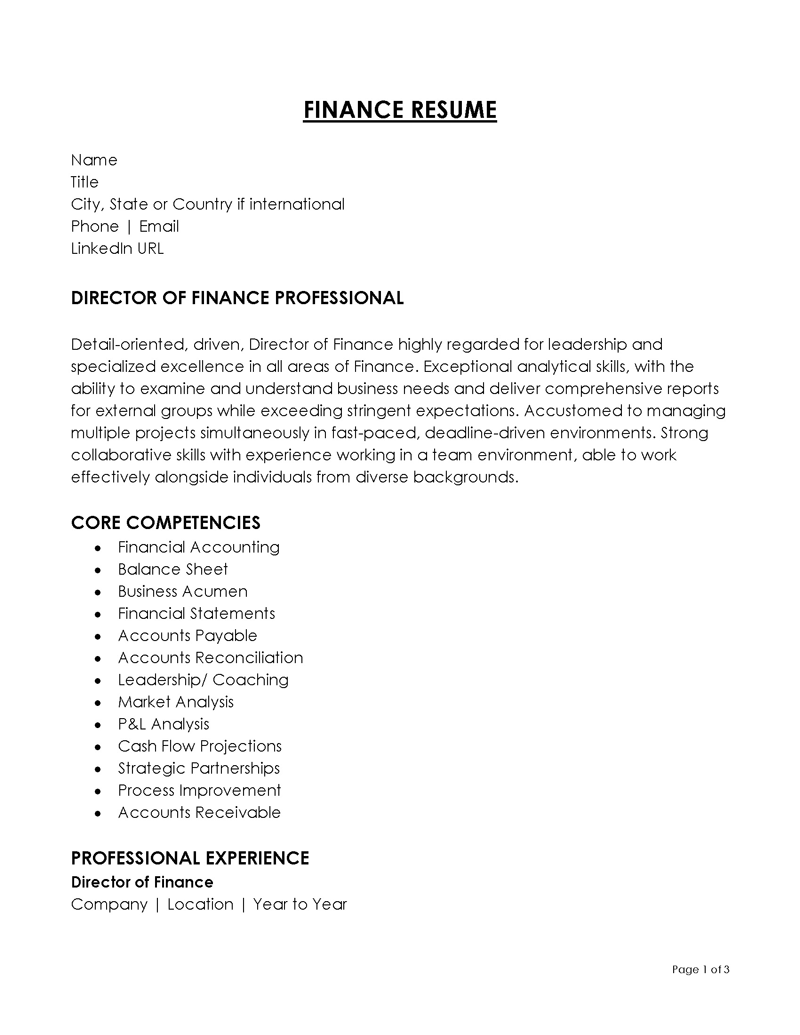

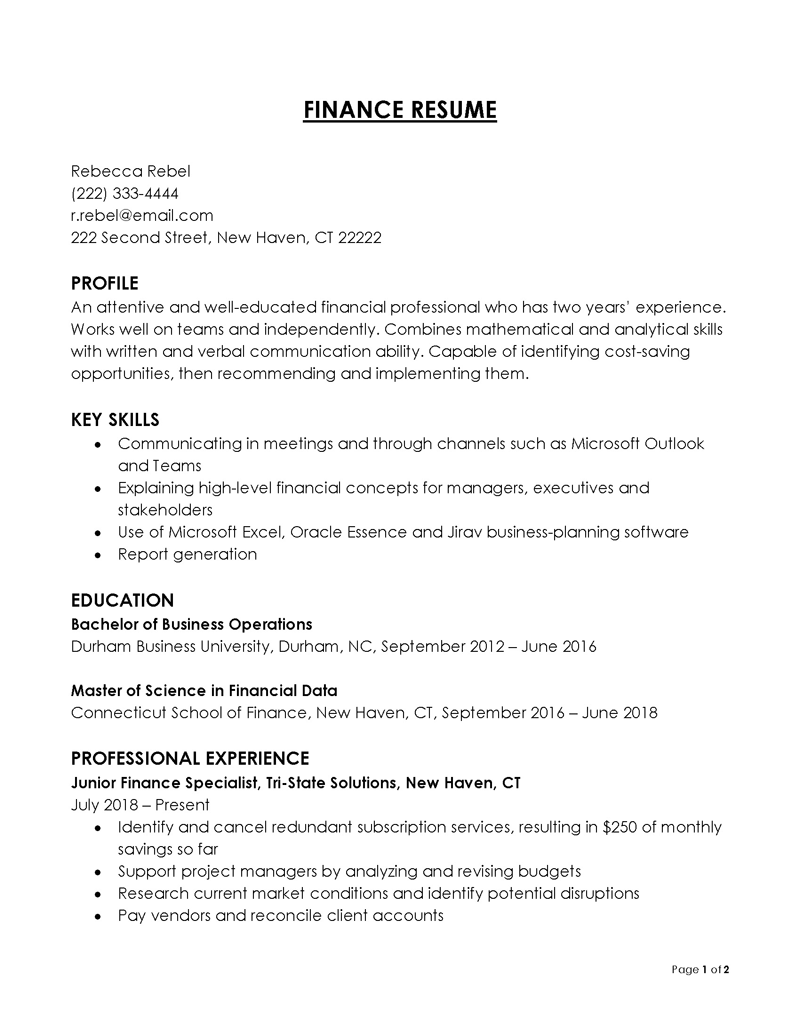
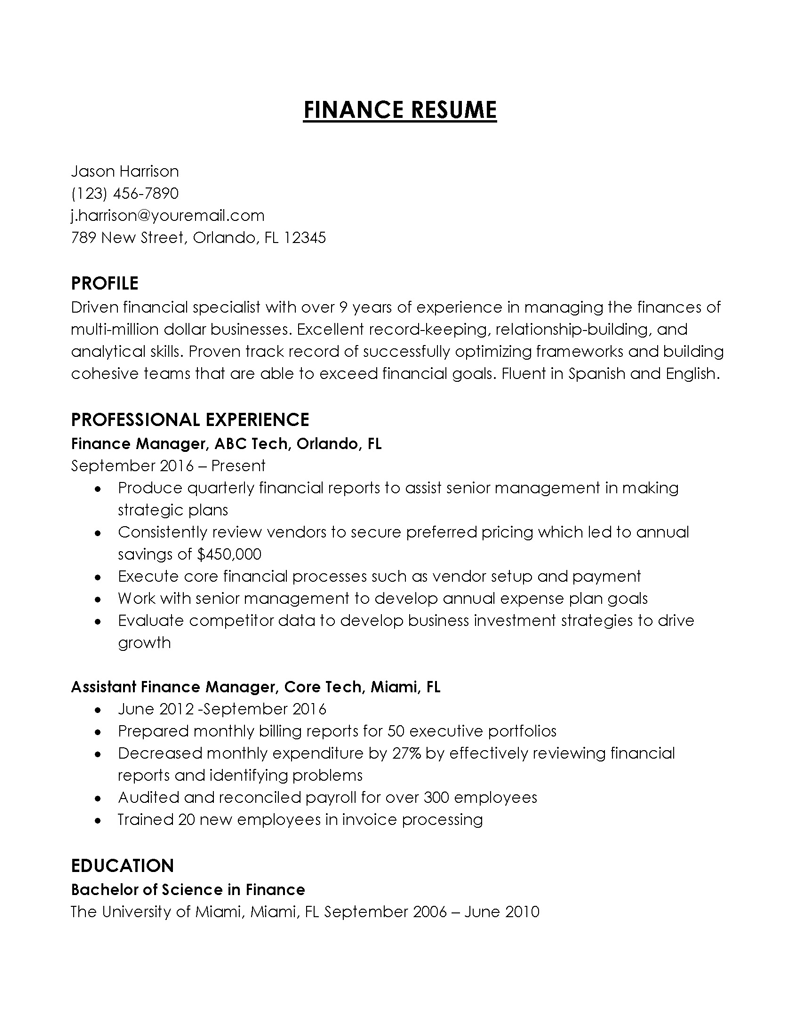
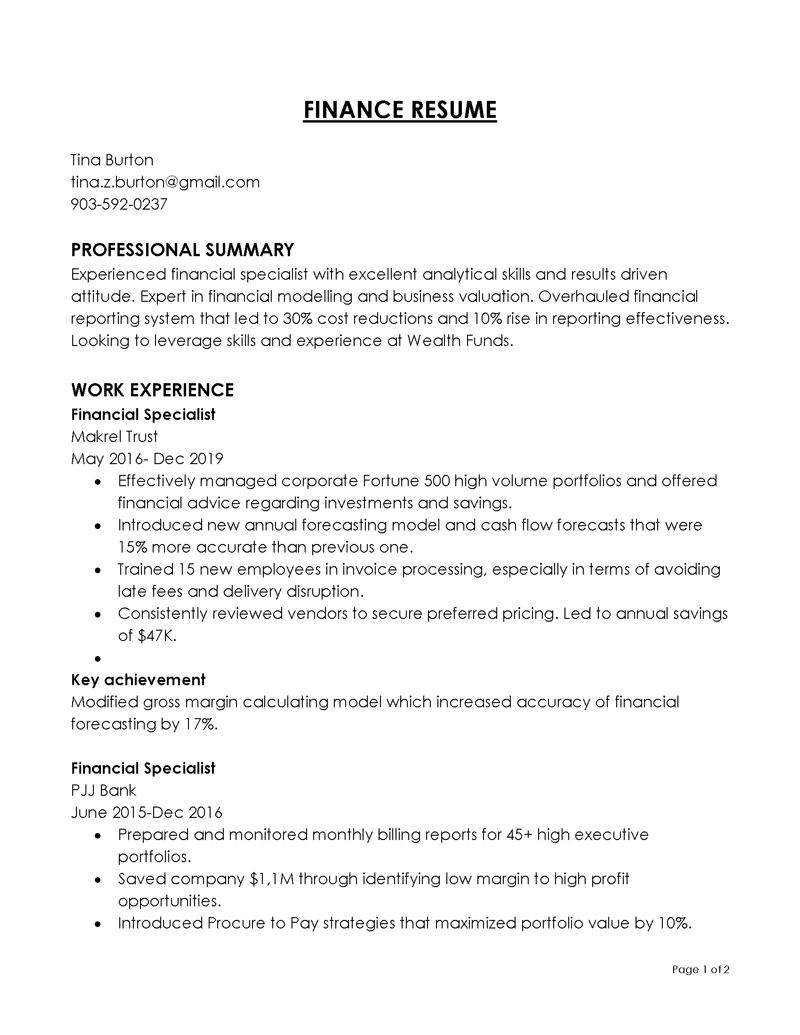
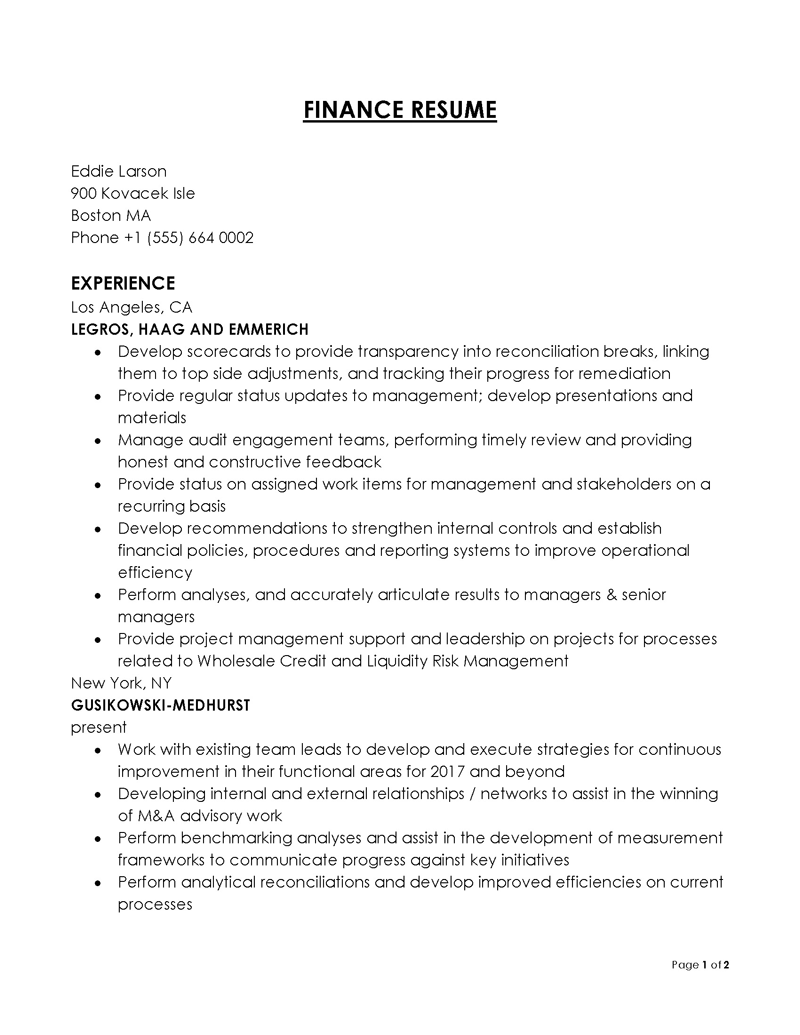
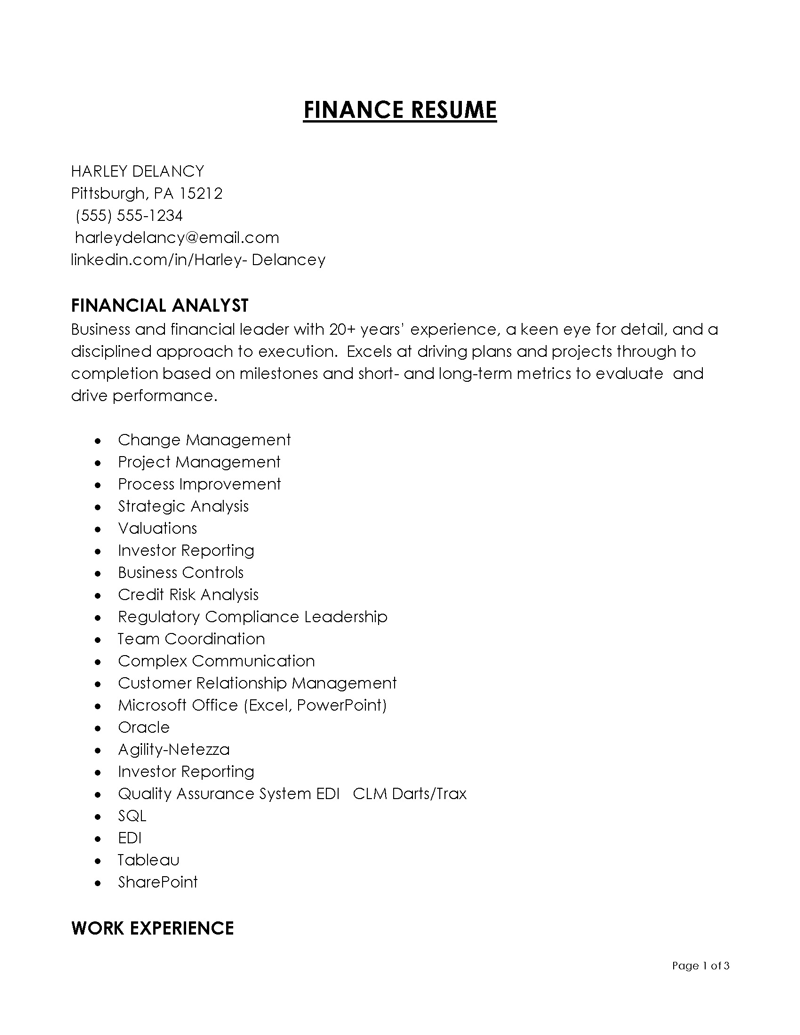
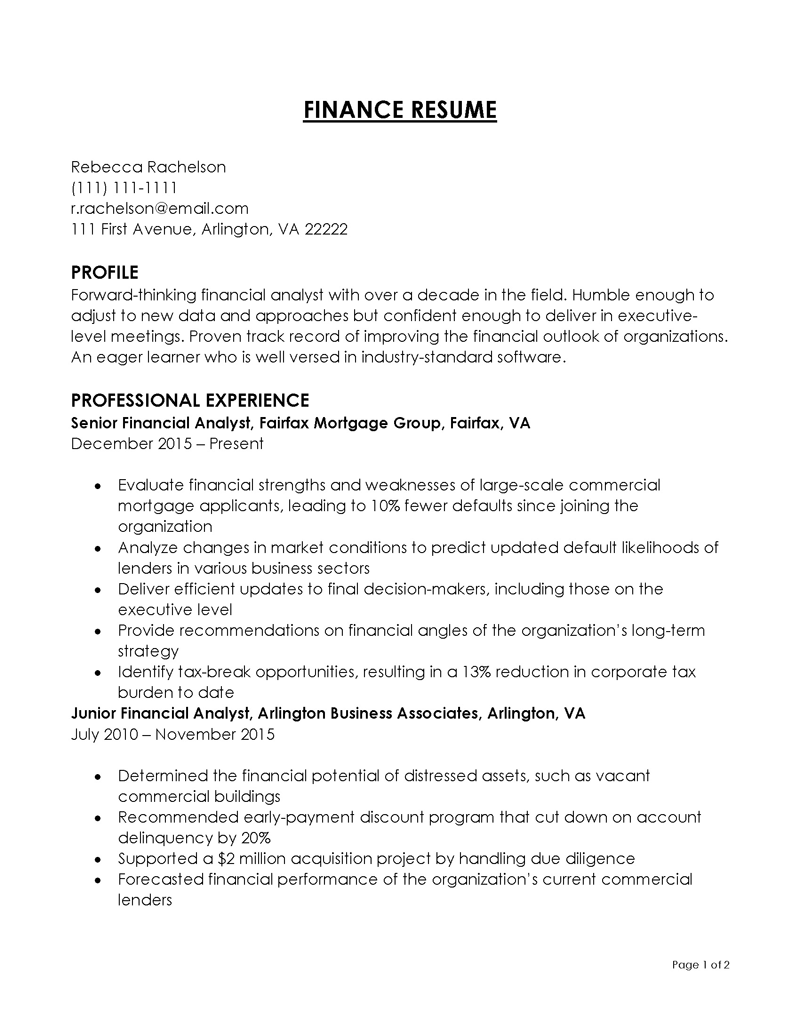
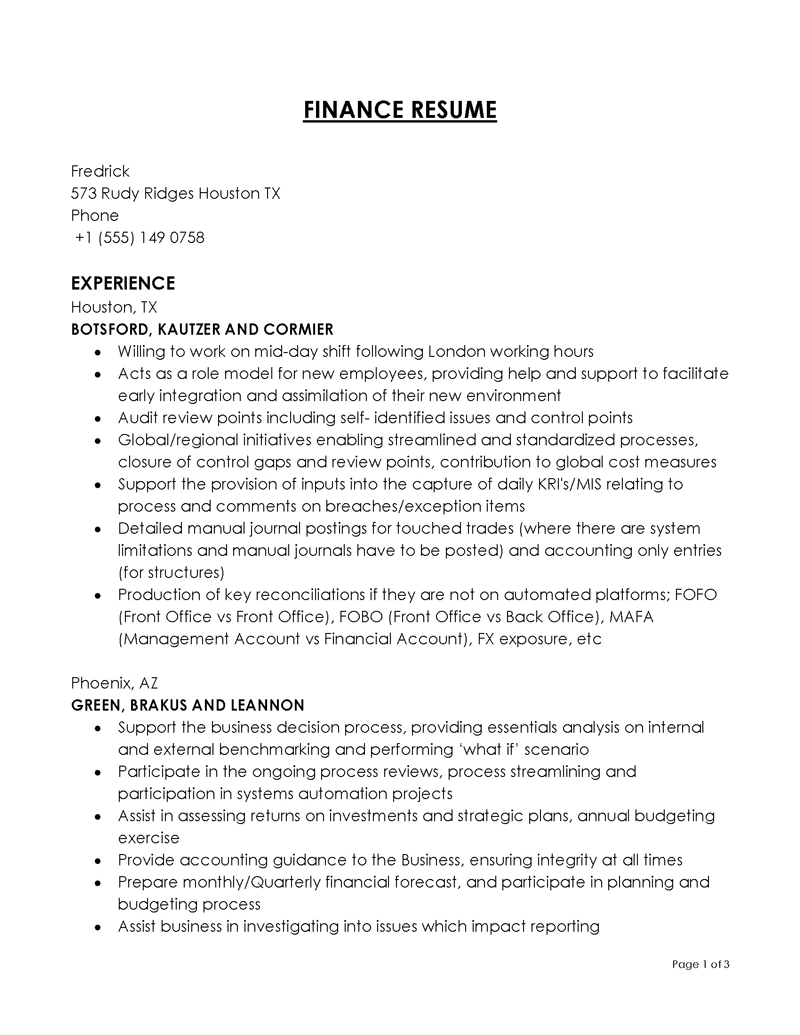

Important Tips for Formatting the Resume
These are some important tips to consider when formatting your resume when applying for a role in the financial sector:
Format choices
When choosing the format, keep in mind that your resume should highlight your best credentials concerning your experience.
The following formats are commonly used:
- Functional format: The functional format emphasizes the applicant’s skills rather than work experience. This format is suitable for applicants with no work experience, those who have worked consistently for at least one year, and those who have gaps in their employment history. When using this format, categorize your skills into sections, and in each section, state how each skill helped you complete a task. The functional format may be used when applying for entry-level jobs where the applicant wants to emphasize their skills more than their work experience.
- Chronological format: The chronological format showcases the applicant’s employment history. This format places more emphasis on your work experience. It is preferred where you are applying for a mid-level position and where the hiring managers’ requirements emphasize work experience. This resume lets the hiring manager quickly establish whether you have the required expertise for the job posting. List your soft and technical skills in addition to your experience to showcase your potential.
- Combination format: The combination format has features of both chronological and functional formats. It combines the elements of the other formats to emphasize the applicant’s employment history and skills. The applicant should include a professional summary or objective statement highlighting their education level, skills, qualifications, and highest achievements. This format is particularly useful for job seekers who have a solid work history and want to highlight their skills and achievements rather than just their job titles and duties. By combining both the work experience and skills sections, a hybrid format can provide a more comprehensive overview of the candidate’s qualifications and suitability for the job. Additionally, a hybrid resume can be tailored to emphasize different aspects of the candidate’s background depending on the job they are applying for.
EXAMPLE
If the job requires strong technical skills, the skills section can be placed before the work experience section and highlighted more prominently.
Use a professional font
Use a standard, easy-to-read font such as Times New Roman, Arial, or Calibri in a size of 10-12 points.
Keep it concise
Keep your finance resume to one or two pages, and use bullet points to make it easy to skim and read.
Use white space effectively
Use margins of at least 1 inch and plenty of white space.
Frequently Asked Questions
Yes, you can, but this is limited to circumstances where you are applying for an entry-level job.
The relevance of your sales experience to the position you are applying for determines how good it will look. Sales experience is best when you are applying for a related job or where the skills are transferrable to the job posting.
To correctly write a master’s degree, list it before your bachelor’s degree. Include the full name of the degree obtained, the university attended, and the period you attended.
To convert your finance resume, customize your job description, certificate, and skills section to emphasize your experience in finance rather than accounting.
To emphasize technical skills, describe your skills in your summary and job description and explain how they helped you perform your roles and improve your expertise.
It is advisable to ensure your resume is at most one page long. You could, however, increase its length if you have sufficient professional experience.
Some of the qualities employers value in finance graduates are accounting skills, analytical skills, technical skills, and good oral and written communication skills.
There are some things you should avoid including, such as age, marital status, political views, irrelevant work experience, salary history, references, unprofessional email addresses, and generic statements. By steering clear of these common mistakes, you can create a resume that presents you in the best possible light and highlights your relevant skills and experience.








